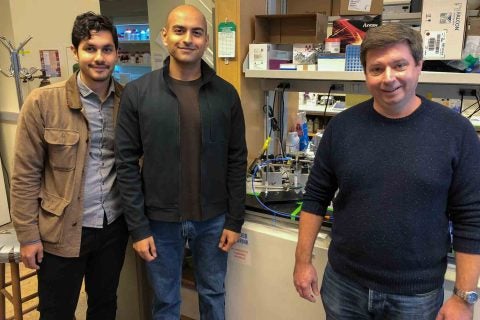Bacteria or virus? Trojan-led startup works on a simple test
Doctors still don’t have a fast and reliable method for diagnosing respiratory infections, but new venture aims at changing that
As a child, Krisna Bhargava PhD ’15 made frequent visits to the doctor’s office, seeking relief for his ongoing coughs, colds and asthma.
Years later, Bhargava’s primary care physician, still a family friend, would confide to him a prominent challenge to treatment: determining whether an infection was caused by bacteria or a virus.
Even in today’s advanced medical world, doctors have yet to obtain a fast and reliable method for diagnosing respiratory infections. Bhargava, now a healthy USC alumnus and postdoc in materials science, aspires to help patients like him who have struggled with this predicament.
To that end, Bhargava and his adviser, Associate Professor Noah Malmstadt, along with USC PhD candidate Bryant Thompson, founded ReoLab, a startup that couples advanced computing and sensing technologies to pinpoint the cause of a respiratory infection, all within a doctor’s appointment.
“Acute respiratory infections with high fever are the most common reason that kids visit the ER,” Bhargava said. “And if you’re a clinician dealing with this, you have to deal with scared parents of a sick child. Without access to lab data quickly, they are really just guessing what to do based on symptoms.”
A harmful status quo
This medical guesswork creates an even larger quandary because antibiotics are heavily overprescribed — to the tune of 47 million excess prescriptions a year.
That’s not all. The needless antibiotics cause nearly $7 billion in adverse drug reaction costs, excessive emergency room visits and the evolution of antibiotic-resistant bacteria called “superbugs” like MRSA and C. Difficile, commonly known as C. Diff.

ReoLab offers a robust solution that couples USC’s expertise in machine learning with sensors based on advanced materials processing. Their system will use a proprietary algorithm to rapidly analyze a blood sample in a shoebox-sized device. Better still, the device can be operated by any health professional; in fact, Bhargava likens the ease-of-use to that of a Keurig coffee machine.
“The goal is to create a complete ecosystem where we integrate the patient’s symptom data, epidemiological data and rapid blood test data to quickly and accurately give clinicians a risk assessment,” Bhargava said. “The final system will allow a nurse or orderly to just load a test ‘pod’ and just hit ‘go’.”
That means a patient’s test results could become available during their appointment, in about 15 minutes. Currently, clinicians rarely use bloodwork for diagnosing infections; blood samples sent out for lab tests can take days, if not weeks, to process.
“The miniaturized diagnostic could improve the speed of diagnosis in real time, which currently doesn’t exist,” said Richard Bachur, the chief of emergency medicine at Boston Children’s Hospital and professor of pediatrics and emergency medicine at Harvard Medical School. Bachur sits on ReoLab’s Scientific Advisory Board.
From the novel algorithms and test results, clinicians can place the patient in one of three risk categories: nonbacterial infection (most likely viral and needs to be monitored); bacterial (antibiotics prescribed); and acute bacterial (antibiotics prescribed; go to the ER).
“What we are trying to do is take the tests and analyses we know already affect outcomes and make it actually practical for the doctor to use it on the patient upfront,” Malmstadt said.
Forging ahead
Bhargava noted that the startup recently completed proving the system’s advantages with analytical data from a prototype. Up next: applying the device in an observational clinical trial.
ReoLab is a perfect example of USC’s leadership in convergent sciences.
Andrea Belz
The trial will involve collecting patients’ blood from an ER or urgent care and testing it with ReoLab’s device. The doctors won’t change their course of intervention from the test, but patient outcomes will be tracked. Bhargava believes the trial will demonstrate the technology’s value.
With a lab facility in Pasadena, ReoLab has been supported in part by the USC Viterbi School of Engineering’s Mousetrap Fund, the USC Coulter Translational Research Partnership Program and the National Institutes of Health. Bhargava has already raised seed funding for the company and is seeking additional funds to support the company’s next steps.
Added Andrea Belz, USC Viterbi’s vice dean for technology innovation and entrepreneurship: “ReoLab is a perfect example of USC’s leadership in convergent sciences. By combining advanced computation with the ‘secret sauce’ of the Malmstadt lab’s advanced manufacturing and sensing technologies, we can enable the next generation of fast, effective diagnostic tools.”
